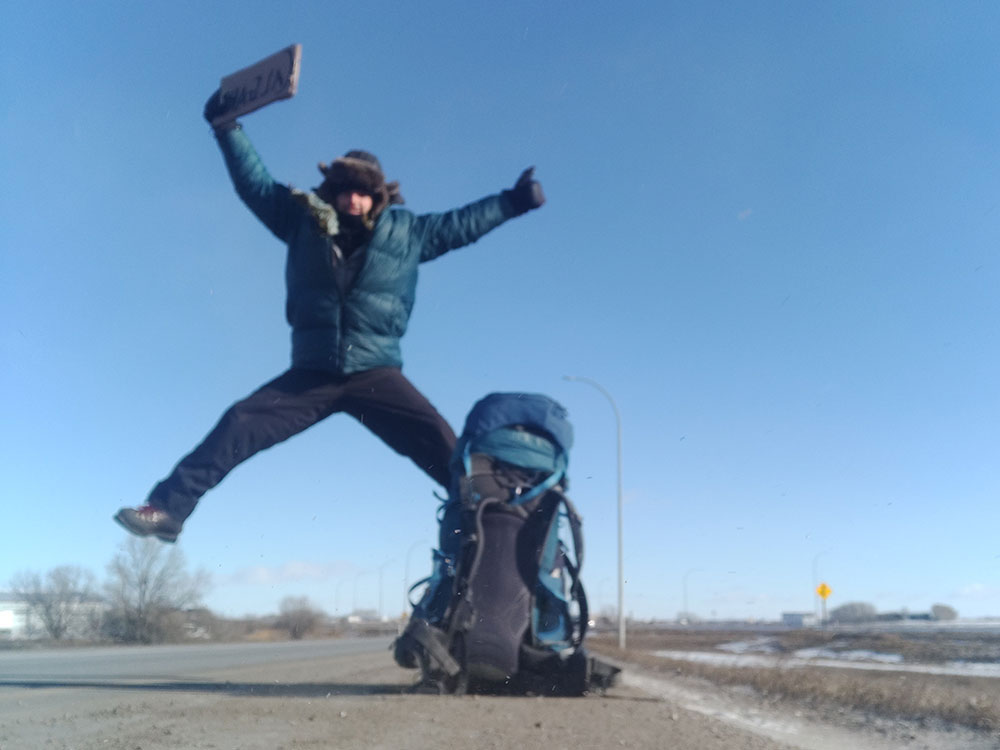May 19, 2023
It was so cold Timothée Govare wore two hats, ski goggles and seven layers under a big puffy jacket as he hitchhiked across the Prairies.
He started his cross-country journey in Charlottetown, P.E.I., celebrating New Year’s with friends before turning westward and starting his roughly 5,900-kilometre journey back home to Vancouver.
All in all he says the journey spanned two weeks and 36 rides with strangers. His total expenses rang in at around $500, mostly for meals.
He could have hopped on a flight to save himself time and discomfort, but Govare says he wanted to practice travelling without supporting one of Canada’s top polluting industries.
“Twenty per cent of people on the planet can afford to fly and it’s the other 80 per cent who will suffer from the climate crisis the first and most,” Govare says.
He’s not alone in trying to travel greener. Elizabeth May, leader of the Green Party of Canada, loves talking about how she travels Canada by train and environmentalist Greta Thunberg traverses the world by rail and in a sailboat.
“When you hitchhike you get a completely different experience,” Govare says. “You won’t know how and when you’ll get there but you connect with so many different people, step into people’s lives you’d never have encountered otherwise. That’s so beautiful.”
Travelling without time constraints and while having money in the bank meant that Govare never had to accept rides that he wasn’t comfortable with. He’s also aware that moving through the world as a white male probably made it easier in some circumstances to get rides, camp without a permit and turn down rides or exit situations when he didn’t feel safe.
Cauliflower Hehner, a female climate activist who has been hitchhiking for 16 years, says it’s important to take safety precautions when hitchhiking.
To start, she says she always travels with someone, and never hitchhikes solo. And she underlines the importance of trusting your gut and always erring on the side of caution.
Never get in a car with anyone you’re uncomfortable with, she says. Never say where you’re going: always ask where someone is going and then choose if you want to ride with them. Take a photo of the car and licence plate on your phone and send it to someone trusted as you approach a ride. Trust your nose: do you smell alcohol or cannabis? Finally, don’t hitchhike at night.
Hehner also prefers riding with families with young kids and avoids riding with solo male drivers.
“It’s just not worth avoiding insulting someone to expose yourself to unnecessary risk,” she says.
On one leg of Govare’s journey, he rode with a member of the Hells Angels — but the only time he felt unsafe was when someone drove through a blizzard faster than he felt comfortable with.
Out of his 36 rides, Govare says only five asked him about himself.
“If I encouraged people to speak, pretty quickly they’ll just hold the microphone the whole time, especially truck drivers,” he says. “People are really lonely — if you speak for six hours straight it’s because you’re super lonely.”
On a typical day, Govare would wake up early in his tent, where he slept inside three sleeping bags. Getting up and putting on his freezing cold boots was the hardest part of the day, he says. It was important to rise early so fewer people saw his tent, or got upset he was camping somewhere he shouldn’t have been.
Then he’d head somewhere warm, like a Tim Hortons or Subway and buy something small so he could sit in the warm space and have time to himself. For breakfast he’d eat nuts and dry oats, which he prefers to cooked oats.
From there he’d go look for a ride.
One strategy is to stand by the side of the road with your thumb out, he says. This gives you less time to talk with someone and get a sense of who they are but is a good way to find people travelling in the direction you want to go. It’s important to “dress properly and clean” to maximize the number of people who will stop for you, he says — though that can be challenging while wearing several layers and ski goggles.
The other strategy is to hang out by a gas station on the edge of town and talk with everyone who comes through. You can talk for a minute or an hour — whatever it takes for all parties to feel comfortable, or call it off, he says.
Finding a ride could take an hour or multiple days.
“When you don’t get picked up it’s crushing,” he says. “You’re vulnerable and facing that judgement of other people.”
Once he’d found a ride and knew what town he’d be dropped off in, he’d check Google Maps, find a copse of trees, and ask his ride to drop him near there. Trees offer a wind break and shelter for pitching a tent overnight.
Then he’d crawl back in his three sleeping bags and fall asleep.
Hitchhiking means giving up physical comfort, Govare says. When it was -35 C, his fingers and feet went numb. It was also uncomfortable to not be certain of where he’d sleep each night.
But every problem came with a solution: if he was cold, he danced around or went inside to warm himself up. And he always found a place to sleep eventually.
And with the bad comes the good. Govare says his favourite interaction was when he asked a woman for directions to a bakery. She helped him, then asked him for directions to a walk-in-clinic because she was from out of town. He decided to repay her kindness and spent half the day with her trying, and being turned away from, several different walk-in clinics before they found one.
She invited him to visit her when he passed through Regina, where she lived.
“She was an artist and her husband had just passed away a couple months ago. She talked my ear off and showed me how her husband used to build harpsichords,” he says. “She was in her 80s, but her life was going through a complete revival.”
She told him how she’d been with her husband when he passed and had spent time with his body after, feeling his spirit in the room with her still. She had placed his ashes in a cardboard box on top of their piano while she decided what to do next.
“Her describing of him passing — I felt so privileged to hear that story,” he says.
To thank her, he shovelled her driveway.
Though Govare enjoyed his trip across the country, he realizes the discomforts and trade-offs aren’t accessible, desirable or be safely accessed by everyone. Violence against Indigenous girls, women and Two-Spirit folks perpetrated on B.C.’s Highway of Tears is due to people having no accessible modes of transportation except hitchhiking, he says.
No one should have to hitchhike. It would be nice if there was a low-emissions high-speed train that connected Western Canada and Eastern Canada, he says.
Slower journeys — like hitchhiking and taking the train — take more time but also allow us to better connect with people and places, Govare says.
“The reason we’re going through climate change is because we’re so disconnected from the world,” he says. If we knew more people in faraway places we’d care about what happens to them.
“People in the Prairies told me they feel like their voice is so small and they don’t feel politically represented,” he says. “That’s so sad. I wouldn’t have known that unless I’d taken the time to cross the country.”
“We need more people to take public transit across the country as it becomes available,” he adds. “But I think it shouldn’t be about going faster. It should be about going nicer. Maybe on a bus there could be round tables where we could talk about climate change or ourselves. We could take that time to connect. After all, it’s a very long trip.”

 thetyee.ca
thetyee.ca
It was so cold Timothée Govare wore two hats, ski goggles and seven layers under a big puffy jacket as he hitchhiked across the Prairies.
He started his cross-country journey in Charlottetown, P.E.I., celebrating New Year’s with friends before turning westward and starting his roughly 5,900-kilometre journey back home to Vancouver.
All in all he says the journey spanned two weeks and 36 rides with strangers. His total expenses rang in at around $500, mostly for meals.
He could have hopped on a flight to save himself time and discomfort, but Govare says he wanted to practice travelling without supporting one of Canada’s top polluting industries.
“Twenty per cent of people on the planet can afford to fly and it’s the other 80 per cent who will suffer from the climate crisis the first and most,” Govare says.
He’s not alone in trying to travel greener. Elizabeth May, leader of the Green Party of Canada, loves talking about how she travels Canada by train and environmentalist Greta Thunberg traverses the world by rail and in a sailboat.
“When you hitchhike you get a completely different experience,” Govare says. “You won’t know how and when you’ll get there but you connect with so many different people, step into people’s lives you’d never have encountered otherwise. That’s so beautiful.”
Travelling without time constraints and while having money in the bank meant that Govare never had to accept rides that he wasn’t comfortable with. He’s also aware that moving through the world as a white male probably made it easier in some circumstances to get rides, camp without a permit and turn down rides or exit situations when he didn’t feel safe.
Cauliflower Hehner, a female climate activist who has been hitchhiking for 16 years, says it’s important to take safety precautions when hitchhiking.
To start, she says she always travels with someone, and never hitchhikes solo. And she underlines the importance of trusting your gut and always erring on the side of caution.
Never get in a car with anyone you’re uncomfortable with, she says. Never say where you’re going: always ask where someone is going and then choose if you want to ride with them. Take a photo of the car and licence plate on your phone and send it to someone trusted as you approach a ride. Trust your nose: do you smell alcohol or cannabis? Finally, don’t hitchhike at night.
Hehner also prefers riding with families with young kids and avoids riding with solo male drivers.
“It’s just not worth avoiding insulting someone to expose yourself to unnecessary risk,” she says.
On one leg of Govare’s journey, he rode with a member of the Hells Angels — but the only time he felt unsafe was when someone drove through a blizzard faster than he felt comfortable with.
Out of his 36 rides, Govare says only five asked him about himself.
“If I encouraged people to speak, pretty quickly they’ll just hold the microphone the whole time, especially truck drivers,” he says. “People are really lonely — if you speak for six hours straight it’s because you’re super lonely.”
On a typical day, Govare would wake up early in his tent, where he slept inside three sleeping bags. Getting up and putting on his freezing cold boots was the hardest part of the day, he says. It was important to rise early so fewer people saw his tent, or got upset he was camping somewhere he shouldn’t have been.
Then he’d head somewhere warm, like a Tim Hortons or Subway and buy something small so he could sit in the warm space and have time to himself. For breakfast he’d eat nuts and dry oats, which he prefers to cooked oats.
From there he’d go look for a ride.
One strategy is to stand by the side of the road with your thumb out, he says. This gives you less time to talk with someone and get a sense of who they are but is a good way to find people travelling in the direction you want to go. It’s important to “dress properly and clean” to maximize the number of people who will stop for you, he says — though that can be challenging while wearing several layers and ski goggles.
The other strategy is to hang out by a gas station on the edge of town and talk with everyone who comes through. You can talk for a minute or an hour — whatever it takes for all parties to feel comfortable, or call it off, he says.
Finding a ride could take an hour or multiple days.
“When you don’t get picked up it’s crushing,” he says. “You’re vulnerable and facing that judgement of other people.”
Once he’d found a ride and knew what town he’d be dropped off in, he’d check Google Maps, find a copse of trees, and ask his ride to drop him near there. Trees offer a wind break and shelter for pitching a tent overnight.
Then he’d crawl back in his three sleeping bags and fall asleep.
Hitchhiking means giving up physical comfort, Govare says. When it was -35 C, his fingers and feet went numb. It was also uncomfortable to not be certain of where he’d sleep each night.
But every problem came with a solution: if he was cold, he danced around or went inside to warm himself up. And he always found a place to sleep eventually.
And with the bad comes the good. Govare says his favourite interaction was when he asked a woman for directions to a bakery. She helped him, then asked him for directions to a walk-in-clinic because she was from out of town. He decided to repay her kindness and spent half the day with her trying, and being turned away from, several different walk-in clinics before they found one.
She invited him to visit her when he passed through Regina, where she lived.
“She was an artist and her husband had just passed away a couple months ago. She talked my ear off and showed me how her husband used to build harpsichords,” he says. “She was in her 80s, but her life was going through a complete revival.”
She told him how she’d been with her husband when he passed and had spent time with his body after, feeling his spirit in the room with her still. She had placed his ashes in a cardboard box on top of their piano while she decided what to do next.
“Her describing of him passing — I felt so privileged to hear that story,” he says.
To thank her, he shovelled her driveway.
Though Govare enjoyed his trip across the country, he realizes the discomforts and trade-offs aren’t accessible, desirable or be safely accessed by everyone. Violence against Indigenous girls, women and Two-Spirit folks perpetrated on B.C.’s Highway of Tears is due to people having no accessible modes of transportation except hitchhiking, he says.
No one should have to hitchhike. It would be nice if there was a low-emissions high-speed train that connected Western Canada and Eastern Canada, he says.
Slower journeys — like hitchhiking and taking the train — take more time but also allow us to better connect with people and places, Govare says.
“The reason we’re going through climate change is because we’re so disconnected from the world,” he says. If we knew more people in faraway places we’d care about what happens to them.
“People in the Prairies told me they feel like their voice is so small and they don’t feel politically represented,” he says. “That’s so sad. I wouldn’t have known that unless I’d taken the time to cross the country.”
“We need more people to take public transit across the country as it becomes available,” he adds. “But I think it shouldn’t be about going faster. It should be about going nicer. Maybe on a bus there could be round tables where we could talk about climate change or ourselves. We could take that time to connect. After all, it’s a very long trip.”

Hitchhiking for the Climate | The Tyee
Timothée Govare crossed Canada in the dead of winter. He says slower travel is possible and even pleasurable.








